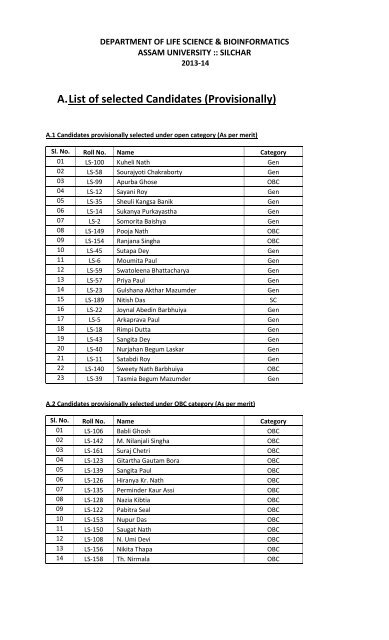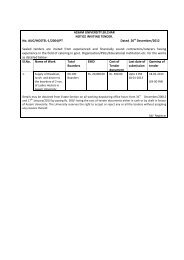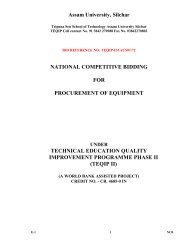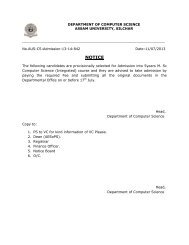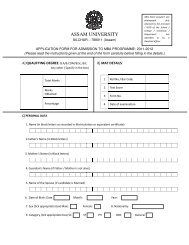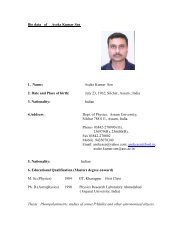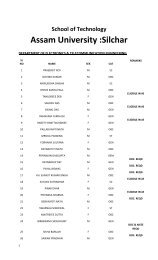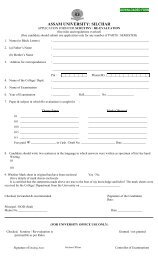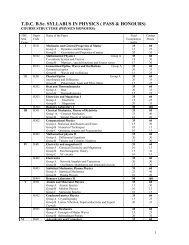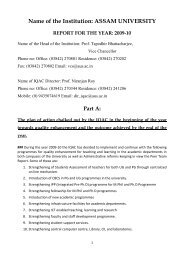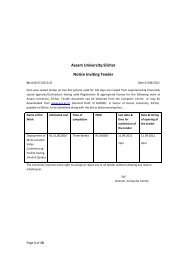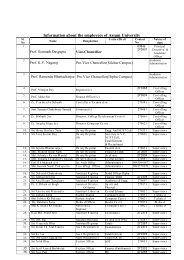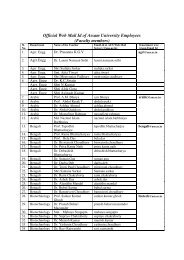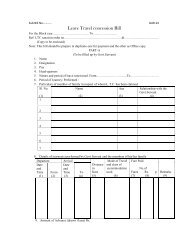List of Selected Candidates for Admission in the ... - Assam University
List of Selected Candidates for Admission in the ... - Assam University
List of Selected Candidates for Admission in the ... - Assam University
Create successful ePaper yourself
Turn your PDF publications into a flip-book with our unique Google optimized e-Paper software.
DEPARTMENT OF LIFE SCIENCE & BIOINFORMATICSASSAM UNIVERSITY :: SILCHAR2013-14A. <strong>List</strong> <strong>of</strong> selected <strong>Candidates</strong> (Provisionally)A.1 <strong>Candidates</strong> provisionally selected under open category (As per merit)Sl. No. Roll No. Name Category01 LS-100 Kuheli Nath Gen02 LS-58 Sourajyoti Chakraborty Gen03 LS-99 Apurba Ghose OBC04 LS-12 Sayani Roy Gen05 LS-35 Sheuli Kangsa Banik Gen06 LS-14 Sukanya Purkayastha Gen07 LS-2 Somorita Baishya Gen08 LS-149 Pooja Nath OBC09 LS-154 Ranjana S<strong>in</strong>gha OBC10 LS-45 Sutapa Dey Gen11 LS-6 Moumita Paul Gen12 LS-59 Swatoleena Bhattacharya Gen13 LS-57 Priya Paul Gen14 LS-23 Gulshana Akthar Mazumder Gen15 LS-189 Nitish Das SC16 LS-22 Joynal Abed<strong>in</strong> Barbhuiya Gen17 LS-5 Arkaprava Paul Gen18 LS-18 Rimpi Dutta Gen19 LS-43 Sangita Dey Gen20 LS-40 Nurjahan Begum Laskar Gen21 LS-11 Satabdi Roy Gen22 LS-140 Sweety Nath Barbhuiya OBC23 LS-39 Tasmia Begum Mazumder GenA.2 <strong>Candidates</strong> provisionally selected under OBC category (As per merit)Sl. No. Roll No. Name Category01 LS-106 Babli Ghosh OBC02 LS-142 M. Nilanjali S<strong>in</strong>gha OBC03 LS-161 Suraj Chetri OBC04 LS-123 Gitartha Gautam Bora OBC05 LS-139 Sangita Paul OBC06 LS-126 Hiranya Kr. Nath OBC07 LS-135 Perm<strong>in</strong>der Kaur Assi OBC08 LS-128 Nazia Kibtia OBC09 LS-122 Pabitra Seal OBC10 LS-153 Nupur Das OBC11 LS-150 Saugat Nath OBC12 LS-108 N. Umi Devi OBC13 LS-156 Nikita Thapa OBC14 LS-158 Th. Nirmala OBC
5) Bathje GJ, Pryor JB. The Relationship <strong>of</strong> Public and Self-‐Stigma to Seek<strong>in</strong>g Mental Health Services. The Journal <strong>of</strong> Mental Health Counsel<strong>in</strong>g. 2011; 33 (2): 161-‐177. P. 172: This f<strong>in</strong>d<strong>in</strong>g is important because self-‐stigma is associated with more negative attitudes toward help-seek<strong>in</strong>g and <strong>the</strong>re<strong>for</strong>e reduces <strong>the</strong> probability that a person will seek counsel<strong>in</strong>g when it is needed. P. 174: This study adds to <strong>the</strong> evidence that <strong>the</strong> stigma <strong>of</strong> mental illness may be harmful to <strong>the</strong> self-‐esteem <strong>of</strong> <strong>in</strong>dividuals who experience psychological problems and act as an impediment to <strong>the</strong>ir seek<strong>in</strong>g counsel<strong>in</strong>g. 6) Hunt J, Eisenberg J. Mental Health Problems and Help-‐Seek<strong>in</strong>g Behavior Among College Students. Journal <strong>of</strong> Adolescent Health. 2010; 46: 3–10. P. 7: In addition, we found that stigmatiz<strong>in</strong>g attitudes <strong>of</strong> students about mental illness (but not <strong>the</strong>ir perceptions <strong>of</strong> o<strong>the</strong>rs’ stigma) were associated with lower help-‐seek<strong>in</strong>g behavior. 7) Workers fear stigma <strong>of</strong> mental health treatment. Drug Benefit Trends. 2010; 22 (2): 55 P. 55: A national survey done by <strong>the</strong> American Psychiatric Association (APA) showed that workers are hesitant to seek treatment <strong>for</strong> mental health issues. Reasons cited <strong>in</strong>cluded concerns about confidentiality or fears <strong>of</strong> loss <strong>of</strong> status <strong>in</strong> <strong>the</strong> workplace. 8) Schomerus G, Angermeyer MC. Stigma and its impact on help-‐seek<strong>in</strong>g <strong>for</strong> mental disorders: what do we know? Epidemiologia e Psichiatria Sociale. 2008; 17 (1): 31-‐37. P. 31: There is pro<strong>of</strong> <strong>of</strong> a particular stigma attached to seek<strong>in</strong>g help <strong>for</strong> a mental problem. Anticipated <strong>in</strong>dividual discrim<strong>in</strong>ation and discrim<strong>in</strong>ation qua self-‐stigmatization are associated with a reduced read<strong>in</strong>ess to seek pr<strong>of</strong>essional help <strong>for</strong> mental disorders. 9) Barney LJ, Griffiths KM, Jorm AF, Christensen H. Stigma about depression and its impact on help-‐seek<strong>in</strong>g <strong>in</strong>tentions. Australian and New Zealand Journal <strong>of</strong> Psychiatry. 2006; 40: 51–54. P. 53: This study found that self-‐stigma and perceived stigma about help-‐seek<strong>in</strong>g <strong>for</strong> depression is common and that both types <strong>of</strong> stigma reduce <strong>the</strong> likelihood <strong>of</strong> help-‐seek<strong>in</strong>g from any pr<strong>of</strong>essional source. The <strong>in</strong>hibitory effect <strong>of</strong> self-‐stigmatiz<strong>in</strong>g views was particularly strong. There is evidence that personal attitudes are more important than <strong>the</strong> disapproval <strong>of</strong> o<strong>the</strong>rs <strong>in</strong> predict<strong>in</strong>g <strong>in</strong>tentions to seek help from ‘mental health pr<strong>of</strong>essionals’. P. 53: Additionally, concerns that o<strong>the</strong>r people will respond negatively were also found to impact on help-seek<strong>in</strong>g likelihood, so <strong>the</strong>re is clearly a need to promote positive societal attitudes as well as improve self-attitudes.10) Vogel D, Wade NG, Haake S. Measur<strong>in</strong>g <strong>the</strong> Self-‐Stigma Associated with Seek<strong>in</strong>g Psychological Help. Journal <strong>of</strong> Counsel<strong>in</strong>g Psychology. 2006, Vol. 53, (3): 325–337. P. 334: Support<strong>in</strong>g <strong>the</strong> validity <strong>of</strong> <strong>the</strong> SSOSH scale, those who had sought psychological services reported significantly less self-‐ stigma be<strong>for</strong>e seek<strong>in</strong>g help than those who had not sought services. 11) Rusch MC, Corrigan PW, Angermeyer N. Mental illness stigma: Concepts, consequences, and <strong>in</strong>itiatives to reduce stigma. European Psychiatry. 2005; 20: 529–539. P. 534: There<strong>for</strong>e <strong>the</strong> greatest s<strong>in</strong>gle cue that produces public stigma is <strong>the</strong> label [61]; this label usually stems from participat<strong>in</strong>g <strong>in</strong> psychiatric services. Potential consumers may opt not to access care as a way to avoid this


